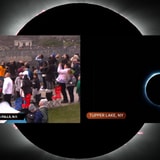fyi
Don't Go Blind Staring At The Sun, Here's How to Safely Watch The Total Solar Eclipse From Anywhere

Whether you're in the path of totality or simply getting a partial view today, pretty much everyone in the United States is giddy about the big solar eclipse.
Of course, you might not have been fully prepared to experience it, so we've put together a collection of useful information on how to watch it safely. You can find resources below for proper safety protocol, but the safest way to participate anywhere in the world is by streaming the eclipse directly from NASA itself.
Watch a stream from different cities:
Via NASA.
When the eclipse will peak in your area
You can use this very handy NASA tool to see exactly when the eclipse will begin, peak and end in your zip code.
 [Credit: NASA]
[Credit: NASA]
Are your eclipse glasses legit?
If you have eye wear designed for the eclipse, you need to first ensure that it's the real deal. The American Astronomical Society has instructions, but the biggest takeaway is that they need to meet the ISO 12312-2 standard. They also have a handy list of safe brands.
No glasses, no problem
If you have a cereal box, some aluminum foil, tape and scissors, you can still make a DIY eclipse viewer where you can watch the light safely. Here's a quick how-to.
This pinhole method might not be as exciting, but it's a lot better than going blind. Here are some other indirect viewing options.
Seriously, don't look at the friggin' sun
Still thinking about taking a quick peek at the sun without proper protection? Please listen to this person below who permanently damaged their vision during the last eclipse.
You're better off missing it entirely than seriously hindering your eyesight. It might be tempting to catch a glimpse, but it's not worth it.
Hi 🙋🏾♀️ this is me!
— Bridge (@iAmBridgeet) April 8, 2024
I appreciate everyone being so kind and using my experience to be cautious for the solar eclipse on Monday. I felt embarrassed for years after this happened but I felt the need to share in case people were “curious” too.
Be safe & loving to your eyes 👁️🤍 https://t.co/4z5cL9N29E
It's not worth taking photos unprotected either
You might be tempted to point your phone at the eclipse to snap a few pics, but that's probably a bad idea too — unless you're using a layer of proper protection in front of the lens.
Losing a phone is a lot less risky than losing your vision, but it's not worth the expense as far as we're concerned.
However, it is worth finding some weird shadows to snap during the partial eclipse phase. Direct observation isn't the only way to capture the moment.
We asked our @NASAHQPhoto team, and the answer is yes, the phone sensor could be damaged just like any other image sensor if it’s pointed directly at the Sun. This is especially true if you’re using any sort of magnifying lens attachment on the phone. You would need to utilize…
— NASA (@NASA) April 4, 2024
[Image: Drew Rae]

